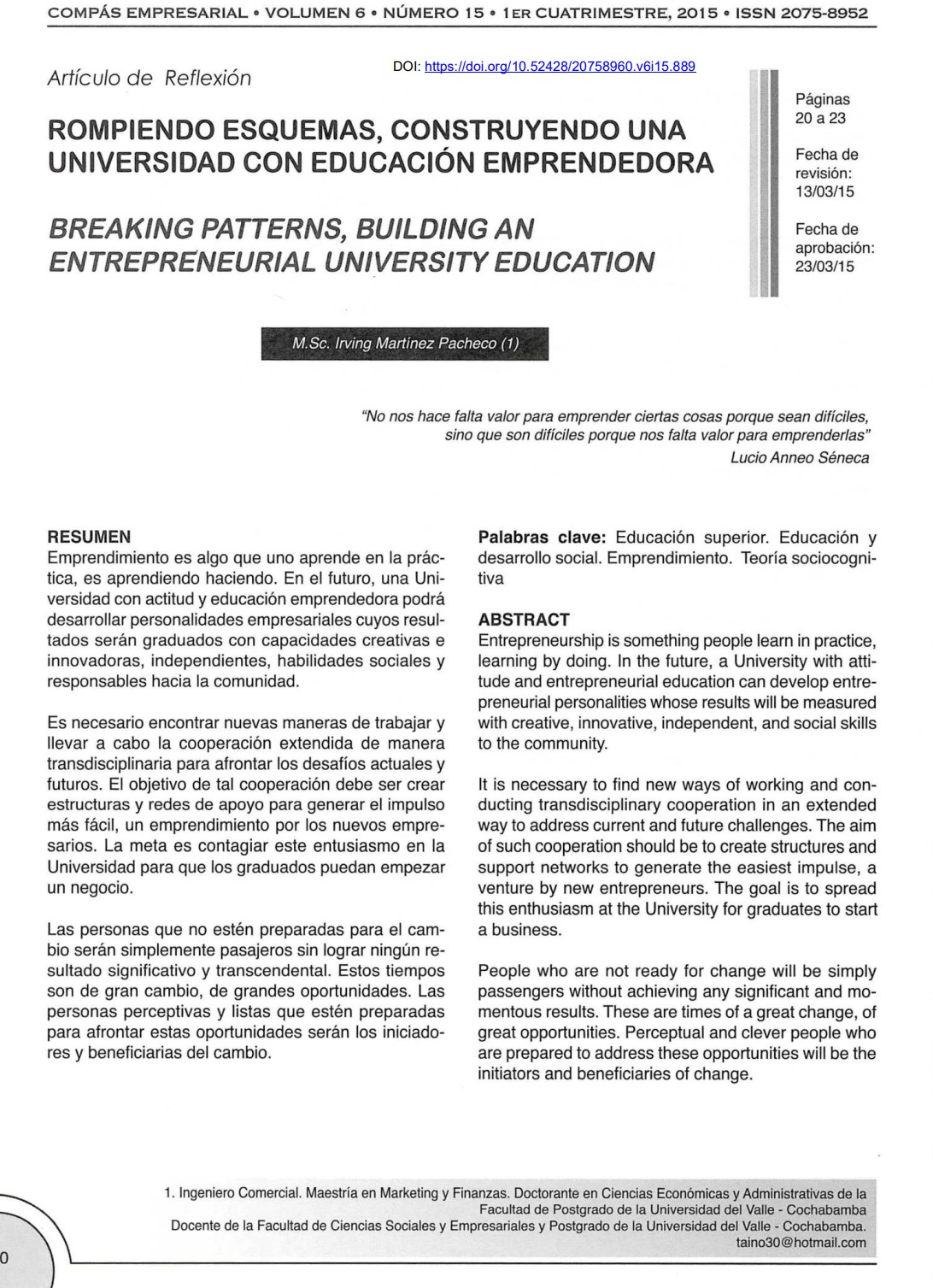Rompiendo Esquemas, Construyendo una Universidad con Educación Emprendedora
DOI:
https://doi.org/10.52428/20758960.v6i15.889Palabras clave:
Educación superior, Educación y desarrollo social, Emprendimiento, Teoría sociocognitivaResumen
Emprendimiento es algo que uno aprende en la práctica, es aprendiendo haciendo. En el futuro, una Universidad con actitud y educación emprendedora podrá desarrollar personalidades empresariales cuyos resultados serán graduados con capacidades creativas e innovadoras, independientes, habilidades sociales y responsables hacia la comunidad. Es necesario encontrar nuevas maneras de trabajar y llevar a cabo la cooperación extendida de manera transdisciplinaria para afrontar los desafíos actuales y futuros. El objetivo de tal cooperación debe ser crear estructuras y redes de apoyo para generar el impulso más fácil, un emprendimiento por los nuevos empresarios. La meta es contagiar este entusiasmo en la Universidad para que los graduados puedan empezar un negocio. Las personas que no estén preparadas para el cambio serán simplemente pasajeros sin lograr ningún resultado significativo y transcendental. Estos tiempos son de gran cambio, de grandes oportunidades. Las personas perceptivas y listas que estén preparadas para afrontar estas oportunidades serán los iniciadores y beneficiarias del cambio.
Descargas
Referencias
(1) WEST 111 PAGE, GATEWOOD ELIZABETH. Hand book of Research in Entrepreneurship Education, US:Edward Elgar Publishing Limited (2009).
(2) VANS DE SIJDE PETER, RIDDER ANNEMARIE. Teaching Entrepreneurship. Germany: Physica Ver lag Heidelberg (2008). https://doi.org/10.1007/978-3-7908-2038-6
(3) BERKUN, S. The Myths of lnnovation. Sebastopol: O'Reily.(2007).
(4) PITTAWAY, L. Entrepreneurship Education: A Systematic Review of the Evidence. lnternational Small Business Journal, 25 (5): 479•510. (2005) https://doi.org/10.1177/0266242607080656
(5) FAYOLLE ALAIN, KYRO PAULA. The Dynamics between Entrepreneurship, Environment and Education, European Research in Entrepreneurship, UK: Edward Elgar Publishing Limited (2005).
(6) FAYOLLE ALAIN. Handbook of Research in Entrepreneurship Education, UK: Edward Elgar Publishing Limited (2007).
(7) PLATINER, H., MEINEL, C. Design thinking, Springer Heidelberg Dordrecht, London, (2012)
(8) VIANNA, M. VIANA, Y. Design thinking, MJV Press, Brazil (2012).
(9) KHRAMKOVA, E. Creativity Thinking or the Ability to Connect to What Is Outside the Box (2009).
(1 O) OSTERWALDER, A. Business Model Generation: A Handbook far Visionaries, Game Changers, and Challengers. Hoboken, NJ: Wiley. (2010).
(11) BLANK, S. The Four Steps to Epiphany. Success ful Strategies far Products that Win. CafePress.com. (2006).
(12) KIRBY, D. A. Entrepreneurship Education and lncubators: Pre•incubators, lncubators and Science Parks as Enterprise Laboratories. Trabajo presentado en la 14ta Annual lnt Ent Conference, Universidad de Nápoles Federico 11, Italia (2004).
(13) LEE. L. lnternational Handbook Entrepreneurship Education: A Compendium of Related lssues, Series on Entrepreneurship: The Life Cycle of Entrepreneurial Ventures, 3 (2): 79•105 (2007).
https://doi.org/10.1007/978-0-387-32313-8_4
(14) FAYOLLE ALAIN, KLANDT HEINZ. lnternational Entrepreneurship Education, UK: Edward Elgar Publishing Limited (2006). https://doi.org/10.4337/9781847201652

Descargas
Publicado
Número
Sección
Licencia
Derechos de autor 2015 lrving Martínez Pacheco

Esta obra está bajo una licencia internacional Creative Commons Atribución 4.0.
Los autores/as que publiquen en esta revista aceptan las siguientes condiciones:
- Los autores/as conservan los derechos de autor y ceden a la revista el derecho de la primera publicación, con el trabajo registrado con la licencia de atribución de Creative Commons 4.0, que permite a terceros utilizar lo publicado siempre que mencionen la autoría del trabajo y a la primera publicación en esta revista.
- Los autores/as pueden realizar otros acuerdos contractuales independientes y adicionales para la distribución no exclusiva de la versión del artículo publicado en esta revista (p. ej., incluirlo en un repositorio institucional o publicarlo en un libro) siempre que indiquen claramente que el trabajo se publicó por primera vez en esta revista.
- Se permite y recomienda a los autores/as a compartir su trabajo en línea (por ejemplo: en repositorios institucionales o páginas web personales) antes y durante el proceso de envío del manuscrito, ya que puede conducir a intercambios productivos, a una mayor y más rápida citación del trabajo publicado.









